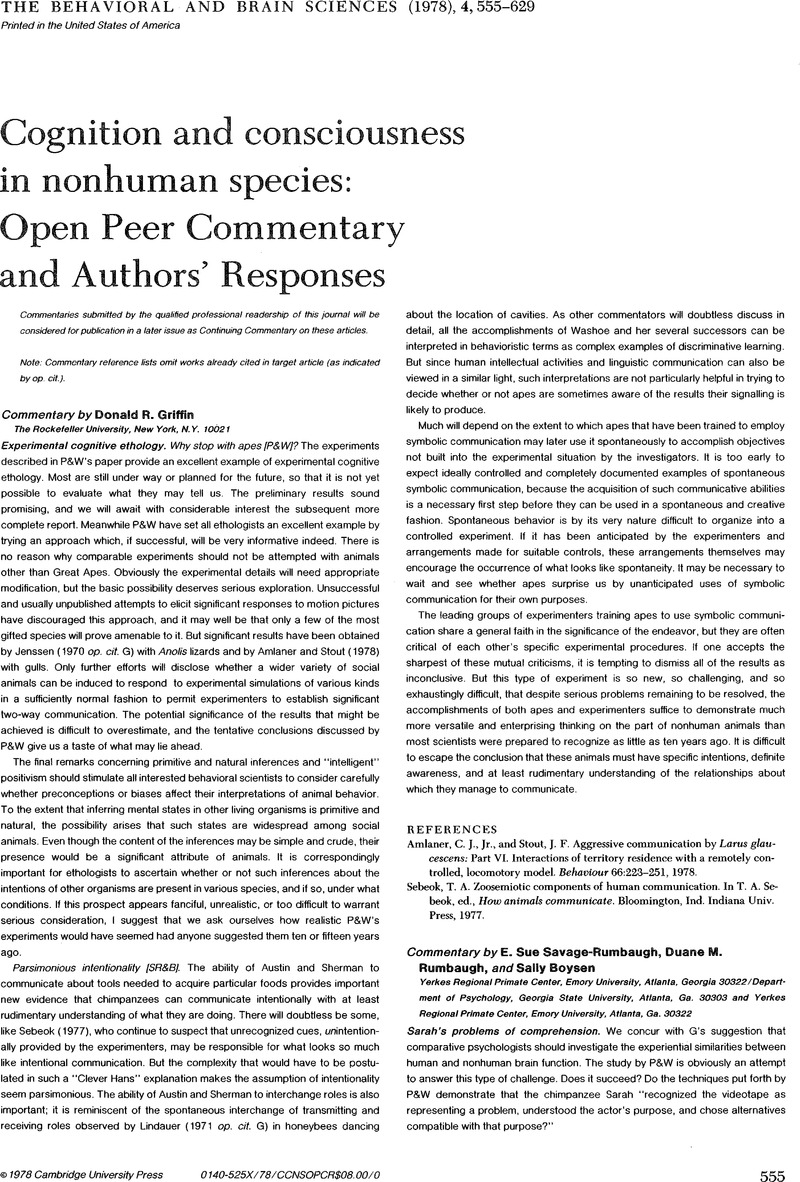Crossref Citations
This article has been cited by the following publications. This list is generated based on data provided by Crossref.
Burghardt, Gordon M.
and
Herzog,, Harold A.
1980.
Commentary: Beyond Conspecifics: Is Brer Rabbit Our Brother?.
BioScience,
Vol. 30,
Issue. 11,
p.
763.
Povinelli, Daniel J.
and
deBlois, Sandra
1992.
On (not) attributing mental states to monkeys: First, know thyself.
Behavioral and Brain Sciences,
Vol. 15,
Issue. 1,
p.
164.
Dittrich, W. H.
1992.
Is the monkeys' world scientifically impenetrable?.
Behavioral and Brain Sciences,
Vol. 15,
Issue. 1,
p.
152.
Visalberghi, Elisabetta
1992.
Is lack of understanding of cause-effect relationships a suitable basis for interpreting monkeys' failures in attribution?.
Behavioral and Brain Sciences,
Vol. 15,
Issue. 1,
p.
169.
Boesch, Christophe
1992.
New elements of a theory of mind in wild chimpanzees.
Behavioral and Brain Sciences,
Vol. 15,
Issue. 1,
p.
149.
Owings, Donald H.
1992.
Calls as labels: An intriguing theme, but one with limitations.
Behavioral and Brain Sciences,
Vol. 15,
Issue. 1,
p.
162.
Snowdon, Charles T.
1992.
The sounds of silence.
Behavioral and Brain Sciences,
Vol. 15,
Issue. 1,
p.
167.
Noble, William
and
Davidson, Iain
1992.
What are mental states?.
Behavioral and Brain Sciences,
Vol. 15,
Issue. 1,
p.
162.
Perloe, Sidney I.
1992.
Exploring the “boundary” between the minds of monkeys and humans.
Behavioral and Brain Sciences,
Vol. 15,
Issue. 1,
p.
163.
Glotzbach, Philip A.
1992.
Perception theory and the attribution of mental states.
Behavioral and Brain Sciences,
Vol. 15,
Issue. 1,
p.
157.
Whiten, A.
1992.
Mind reading, pretence and imitation in monkeys and apes.
Behavioral and Brain Sciences,
Vol. 15,
Issue. 1,
p.
170.
Burghardt, Gordon M.
1992.
Looking inside monkey minds: Milestone or millstone.
Behavioral and Brain Sciences,
Vol. 15,
Issue. 1,
p.
150.
Cheney, Dorothy L.
and
Seyfarth, Robert M.
1992.
Characterizing the mind of another species.
Behavioral and Brain Sciences,
Vol. 15,
Issue. 1,
p.
172.
Armstrong, D. M.
1992.
Monkeys and consciousness.
Behavioral and Brain Sciences,
Vol. 15,
Issue. 1,
p.
147.
Gouzoules, Harold
1992.
In this best of all possible monkey worlds?.
Behavioral and Brain Sciences,
Vol. 15,
Issue. 1,
p.
158.
Cheney, Dorothy L.
and
Seyfarth, Robert M.
1992.
Précis ofHow monkeys see the world.
Behavioral and Brain Sciences,
Vol. 15,
Issue. 1,
p.
135.
Galdikas, Biruté
1992.
Social and nonsocial intelligence in orangutans.
Behavioral and Brain Sciences,
Vol. 15,
Issue. 1,
p.
156.
Happé, Francesca
and
Frith, Ulta
1992.
How autistics see the world.
Behavioral and Brain Sciences,
Vol. 15,
Issue. 1,
p.
159.
Harcourt, A. H.
1992.
“How monkeys see the world.” Why monkeys?.
Behavioral and Brain Sciences,
Vol. 15,
Issue. 1,
p.
160.
Schull, Jonathan
and
Smith, J. David
1992.
Knowing thyself, knowing the other: They're not the same.
Behavioral and Brain Sciences,
Vol. 15,
Issue. 1,
p.
166.


